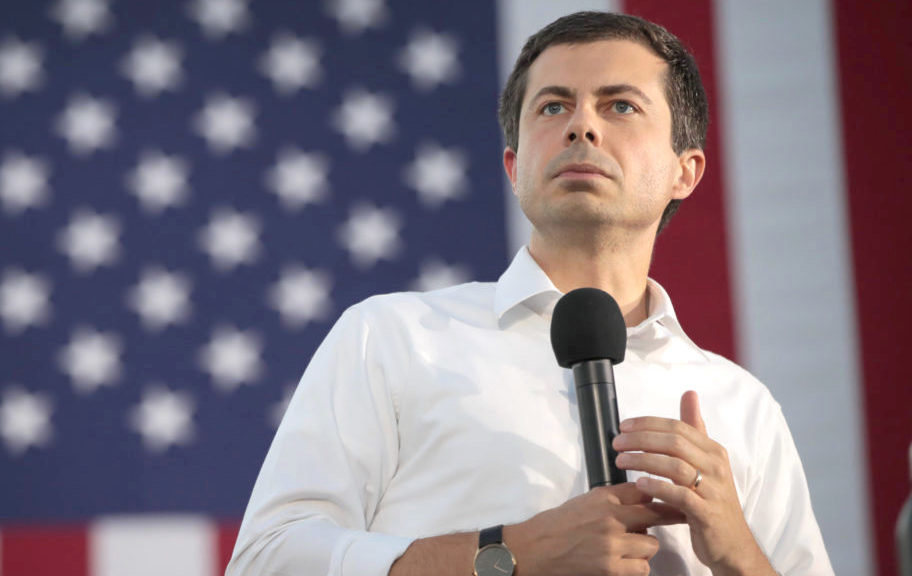Yes, there are Jews in Mayor Pete’s South Bend
This is one of series articles on what eight of the Democratic presidential hopefuls have said or done regarding Israel and other Jewish concerns. It was assembled by the staff of the JTA before the latest debate and edited by The Jewish Star for space and style. Link here for the other candidates: Amy Klobuchar, Andrew Yang, Bernie Sanders, Cory Booker, Elizabeth Warren, Joe Biden, Mike Bloomberg, Pete Buttigieg
Pete Buttigieg, the charismatic mayor of South Bend, Indiana — a community that’s home to a growing Orthodox Jewish population — has risen from relative unknown to near household name (for those who can pronounce his) over the course of the 2020 campaign. He is young, gay, moderately liberal on most issues and outspoken about his Christian faith.
Here’s where he stands on Jewish issues.
On anti-Semitism.
At a meeting with Jewish community groups in May 2019, Buttigieg accused the White House of welcoming people who “are blatantly anti-Semitic” and excusing “people who walk the streets chanting ‘Jews will not replace us’.” He was referring to the neo-Nazi march on Charlottesville, when President Trump said there were “very fine people” on “both sides” of the violence that broke out.
“No, ‘both sides’ are not responsible for a neo-Nazi terrorist murdering a woman in Charlottesville,” and what happened was “beyond politics,” Buttigieg tweeted in August 2017.
Buttigieg clashed with Rep. Ilhan Omar when she said that Americans should be as alert to religious discrimination in Israel as they are in Iran.
“The idea that what’s going on is equivalent is just wrong,” he said.
However, Buttigieg said he was “disappointed” to see Israel bar Omar and Rashida Tlaib, another congresswoman who backs the BDS movement, from entering the country.
Where does Buttigieg stand on BDS?
He has never addressed BDS.
What’s his relationship with Jewish groups?
Unlike many of his older primary peers, Buttigieg has no long history with many of the prominent national Jewish organizations that court presidential candidates, though he spoke at the J Street’s conference in 2019 and a former AIPAC president, Steve Grossman, has endorsed him. However, he does have a relationship with the American Jewish Committee: In May 2018, before declaring his run for president, he participated in AJC’s Project Interchange tour of Israel with a group of U.S. mayors. “Engagement is very important,” Buttigieg said after the trip.
What about Israel in general?
In November 2019, after missiles were fired from Gaza into Israel, Buttigieg tweeted, “I strongly condemn the rocket attacks on the citizens of southern and central Israel. Israel has a right to defend itself against acts of terror that set back any progress towards peace and will only serve to inflame the humanitarian situation in Gaza.”
He has also said he would not move the U.S. embassy back to Tel Aviv from Jersualem, telling Axios, “What’s done is done.”
However, he has also been critical of Israeli policy at times: In a Q&A with the New York Times, Buttigieg called Israel’s human rights record “problematic” and “moving in the wrong direction under the current right-wing government.”
In October, he told the Council on Foreign Relations, “I disagree with… overreach in the West Bank and Gaza and short-sighted focus on military responses. The humanitarian catastrophe in Gaza has gone on far too long and provides a ripe environment for the very extremist violence that threatens Israel.”
In spite of all this, Buttiegieg thinks support for Israel should be non-partisan: “There’s a risk that support for Israel could come to be regarded as a partisan issue and I think that would be really unfortunate,” he said in 2018, after that AJC trip to Israel. “One of the first things you realize when you get on the ground is that this is not a left versus right issue — at least it shouldn’t be. The Democratic Party is, I think, ultimately committed to the idea of peace and security and stability and fairness for everybody.”
In a foreign policy speech in June 2019, he said, “If Prime Minister Netanyahu makes good on his threat to annex West Bank settlements, a President Buttigieg will take steps to ensure that American taxpayers won’t foot the bill.”
What about a two-state solution?
Buttigieg said that “a two-state solution that achieves legitimate Palestinian aspirations and meets Israel’s security needs remains the only viable way forward.”
One of the biggest issues, he told Jewish groups in May 2019, is that “we don’t have the right kinds of partners in leadership on the Palestinian side, is that we have to invest more energy in constraining their worst impulses than in trying to get a good outcome.”
Would he leverage U.S. aid to Israel?
Buttigieg has said that aid to Israel could be “leverage to guide Israel in the right direction.”
“We need to make sure that any such cooperation and funding is going to things that are compatible with U.S. objectives and U.S. law,” Buttigieg said at a J Street conference in October 2019. “[W]e need to have the visibility to know whether U.S. funds are being used in a way that is not compatible with U.S. policy, and U.S. policy should not be promoting this kind of construction precisely because it is incompatible or at best detrimental to [the two-state solution].”
Jewish fun fact
While Buttigieg would be the first openly gay major ticket nominee, he’s not the first candidate: Fred Karger, who is Jewish and gay, sought the Republican nomination in 2012.

 49.0°,
Fair
49.0°,
Fair 




